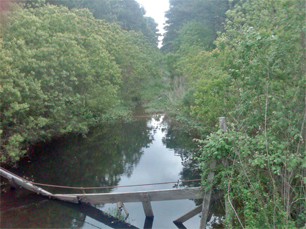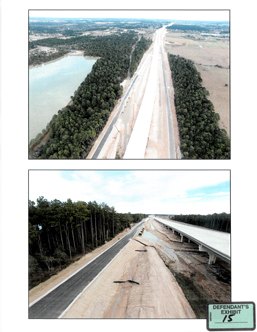Don Griffin, Jr. and Billy Coe Dyer have secured what is believed to be the largest jury verdict for a property owner in a land condemnation case against the State of Texas.
A Harris County jury awarded $28.8 million to CC Telge Road, which lost millions after state officials built a toll road in the middle of a forested watershed that would have been the focal point of a lucrative development project in Northwest Houston.
The Vinson & Elkins partners say the judgment could grow to $31 million if Harris County Court at Law Judge George Barnstone adds interest to the verdict.
The dispute dates back to 2010, when CC Telge Road purchased 617 acres of a high-density, single-family residential community called Willow Creek to be developed by Houston-based Caldwell Companies. The property included an attractive forested watershed, which Caldwell planned to make the selling point of Willow Creek, along which residents could enjoy trails, sports fields and other gathering places.

The State of Texas already had condemnation rights of 40 acres of that land, which it planned to use to construct an elevated highway as part of the Grand Parkway Toll Road Project. The caveat was that the route the state wanted went straight through the watershed.
Griffin and Dyer said Fred Caldwell, the CEO of Caldwell companies, did everything he could to try to convince the state to alter the toll road route to not go through the watershed. He and his team met with Grand Parkway and Texas Department of Transportation authorities multiple times, and made presentations in an attempt to persuade them that the project could easily be built south of the watershed. Caldwell argued that the state would save millions on construction costs since building a toll road through a watershed requires the construction of a bridge.

The response was the same: “We have a record of decision that is final,” Dyer said.
Griffin and Dyer said the project still moved forward, but is “much different” from what Mr. Caldwell had originally envisioned.
Instead of building a high-density, single-family property, Caldwell built Willow Creek as a low density, acreage-lot community with significantly fewer amenities near the creek, which now exists under and next to the elevated toll road that TxDOT built.
“When you rip 40 acres of creek and flood plain and replace it with an elevated toll road where people do not want to gather a community outdoors… it completely destroys the potential for the amenity package we envisioned to draw people to the community,” said Griffin.

The direct result of the altered project, the lawyers said, was a significant loss of value compared to how much Caldwell’s original vision would have been worth.
“[Fred] has been relatively successful. The pace of sales dropped off somewhat from when Willow Creek first started… but as you can imagine, there are much fewer people in the marketplace to buy an 80,000 square foot lot as opposed to a 10,000 square foot lot for a home,” Griffin said.
When the state and Caldwell could not agree on a price for the state to properly compensate the private landowners for the loss in value, state officials filed the required condemnation lawsuit.
During the two-week trial, Griffin and Dyer presented evidence that revealed at about the same time Caldwell was trying to negotiate with TxDOT, the state accommodated a different private developer for an adjacent segment of the Grand Parkway Toll Road by shifting the alignment of the toll road construction as the private developer had requested.
The jury sided unanimously with Caldwell and CC Telge Road Friday afternoon by awarding $28.8 million, which accounted for the difference between the value appraisal of the original vision of the Willow Creek development and what Caldwell actually built.
Griffin said there have been other condemnation cases related to the Grand Parkway project, and “in every case,” the state has “aimed low and missed” in terms of what it attempted to pay the private developers.

“It’s frustrating representing property owners when they’re just not being treated fairly,” he said.
Anthony Tony Blazi, an Assistant Attorney General in the Texas AG’s Office, declined to comment on the litigation, but Griffin and Dyer said they anticipate the state to appeal the verdict – especially due to the amount awarded.
They said at trial, Blazi received assistance from two young attorneys out of the AG’s office, Glorieni Azeredo and Matt Harriger.
Griffin and Dyer said they got involved in the case due to the reputation of V&E attorney H. Dixon Montague, who had handled previous matters for Caldwell and has a national reputation for his condemnation practice.
Montague had originally gotten involved in 2010 or 2011, they said, but Griffin and Dyer took over after Montague was diagnosed with cancer.
“He hasn’t been actively involved in our group since Jan. 1 of 2017, although Billy and I virtually say our success goes right back to Dixon and Dixon’s reputation nationwide,” Griffin said.
“And all he’s trained us to do,” Dyer added.
